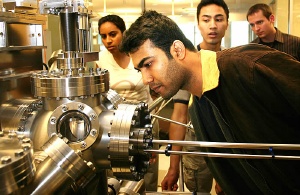Mar 5 2009
UT Dallas is introducing a new minor in nanoscience and technology, enabling undergraduates to augment their core studies with a grounding in what's also known as molecular engineering.

Offered for the first time next fall, the minor has already attracted more than two dozen prospective students from an array of majors – including electrical engineering, chemistry, physics and biology – underscoring the multidisciplinary nature of nanotechnology.
All nanotech activities operate at a minuscule scale, but the goals of individual projects range from improved cancer treatment therapies to lighter aircraft materials.
“Our objective is to provide students with an in-depth understanding of nanotechnology, including its scope, how it can be performed and what it can produce,” said Yves Chabal, head of the University’s Department of Materials Science and Engineering and holder of the Texas Instruments Distinguished Chair in Nanoelectronics. “This is also a great means for students to establish connections with other students interested in nanotechnology and with faculty involved in the field. It should foster even greater interdisciplinary collaboration by bringing together students from many different majors.”
The minor’s core course, Introduction to Nanotechnology and Nanoscience, is already being offered this semester. It familiarizes students with key tools and principles that come into play when working at the nano-scale, where scientists and engineers encounter quantum mechanical and thermodynamic properties that just aren’t an issue in macro-scale activities like manufacturing cars or refrigerators.
The survey course also explores potential applications for nanotechnology in engineering, materials science, physics, chemistry, biology, electronics and energy production. The course was developed by Eric Vogel, an associate professor of materials science and engineering, whose research explores how to extend, replace and complement CMOS, which is today’s dominant semiconductor technology.
Two UT Dallas students were instrumental in creating the new minor. As freshmen, Bradley Wallace and Austin Swafford each worked in nanotechnology labs at the University, and, after determining there was high interest in nanotech among their fellow students, they petitioned for the addition to the curriculum.
But they did more than just that. They also researched the few nanoscience offerings at other universities, discussed a prospective curriculum with UT Dallas researchers, outlined a set of basic new courses that would be needed, compiled a list of optional courses students could use to individualize their studies and provided examples of four-year course schedules for a dozen majors that could include a minor in nanoscience.
“Grad students already come from around the world to work in the University’s nanotechnology labs,” Wallace said, “and now UT Dallas can provide comparable offerings to undergraduates.”
The two students – both of them UT Dallas McDermott Scholars – are now too far along in their own undergraduate careers to take advantage of the minor, but they’ve already set their sights on their next goals: Swafford plans to pursue a Ph.D. in biomedical engineering as preparation for a career in bio-nanotechnology, and Wallace will enter medical school in the fall.